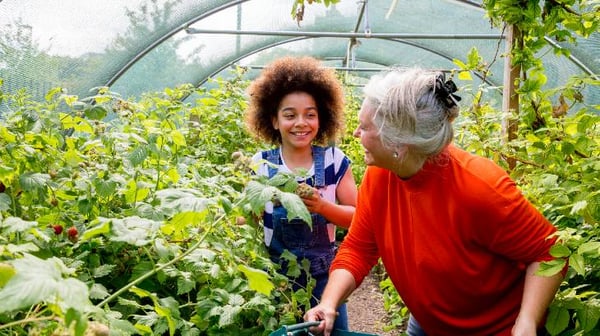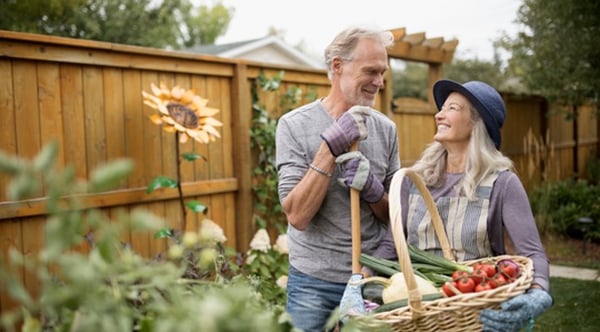The benefits of gardening
Gardening is about so much more than pretty hedges and a pleasant way to pass the time. Thanks to the unique combination of physical activity, mental engagement and the healing powers of the great outdoors, the benefits of gardening could be key to a healthier and longer life. In this guide, we look at why gardening is good for you – physically, socially and in terms of your mental health.

Physical benefits of gardening
Is gardening good exercise? Can a gentle hobby like gardening really contribute to a healthier weight and lower blood pressure? It would appear so. Here are some of the physical benefits of improving your gardening game.
- Burn calories. An hour of wedding can burn between 200 and 400 calories. Digging, planting, weeding and general tidying of the garden is rigorous work. A good hour of these kinds of activities could leave you in better physical health.
- Weight loss. Gardening is a physical activity, and everything from turning compost to raking requires physical exertion. Back in 2014, astudy published in the American Journal of Public Health measured the impact of gardening on Body Mass Index (BMI), and found that gardeners had significantly lower BMIs than their neighbours who weren't gardening.
- Lower blood pressure. Being active lowers your blood pressure. Just 30 minutes of moderate activity in the garden most days of the week can be the lifestyle change needed to help control high blood pressure and reduce the risk of hypertension.
How gardening reduces your health risks
There are no shortage of ways that gardening can lessen your chances of experiencing serious health problems. Here are just some of the health benefits of gardening.

Reduced risk of heart attacks. According to the British Medical Journal, gardening helps reduce the risk of heart attack or stroke among people over 60 by as much as 30%.
Increased vitamin D production. The UK National Diet and Nutrition Survey states that 20% of us are vitamin D deficient, with the over 65s cited as one of the groups most at risk. Any activity that gets us outside can give us much needed sunlight - another benefit of gardening.
Improved diet.
Another good reason to embrace gardening is that you can grow your own produce to eat, which encourages healthy living. It also provides an opportunity to teach loved ones such as grandchildren about the natural world, and encourages others to eat delicious nutricious meals.


Reduced risk of dementia.
Analysis published by Alzheimer's Society indicates regular exercise can reduce the risk of developing dementia by about 28%. Physical exercise comes in many forms, not just playing sport. Daily activities such as, brisk walking, cleaning and gardening also count too.
Wellbeing benefits of gardening
Whether it's the feeling of getting your hands dirty, the sensory stimulation of nature itself or the distraction gardening offers from the everyday worries of life, the links between gardening and mental health are strong.
Research from the Royal Horticultural Society reveals that there is a significant association between gardening more frequently and improvements in wellbeing. It suggests that regular gardeners score 6.6% higher on wellbeing measurements and 4.2% lower on stress than those who don't garden at all.
But, why is gardening good for our mood? Here's what we know about the benefits of gardening for our mental health:
Stress relief
The preventative Medicine Report 2017 found that the act of growing plants boosts mood, improves the quality of your life and changes your outlook.
A sense of purpose
Having something to care for provides a reason to get up every day. Gardening provides a year-round routing of jobs to perform, which for those suffering from poor mental health, could restore a sense of confidence and purpose.

Enhanced mood.
Whether it’s venting our frustrations over some therapeutic pruning, or sitting back and admiring what you’ve achieved, gardening can help you feel lighter after all your hard work.
Social benefits of gardening
Gardening provides a reason for people to connect and it’s a relatively accessible activity – anyone can do it. Moreover, GPs are already recommending social prescriptions such as gardening to treat a variety of ailments.
Even if you don’t have a garden, you could consider applying for a local allotment. This provides a great opportunity to get to know the community, and according to a 2016 study published by the Journal of Public Health, people who do their gardening in allotments can enhance their self-esteem and general health.
Tips for getting the most out of gardening
Take a leaf out of our book with these handy gardening tips.
1.Get to know your garden better
Understanding your garden’s aspect and conditions will help you choose plants that will thrive without taking up too much of your time. Take note of where gets the most sun and when. Are there any shady patches? Is there shade all day or does it change throughout the day or seasons? Where are the damp patches? This will help narrow down your search for appropriate plants.
2. Test your soil
This is vital for selecting plants that will flourish. Find out what is already growing well in the garden; this helps to determine whether you have acidic or alkaline soil. To be certain, pick up a pH soil test from your local garden centre
3. Plan your garden
It’s easy to feel overwhelmed by the sheer choice presented at the garden centre and just going with what looks pretty. However, with a little preparation, you can do your research and decide on some useful questions to ask the experts. Think about the different heights you might want to achieve, where you would like to grow any creepers, whether you would like containers on the patio, and any showstoppers like ornaments or water features. Try to plan for year-round colour with evergreens and depending on the light, where different blooms should go for different seasons.
4. Prepare the soil
Once the planning is done, it’s time to prepare the soil for planting. Beds will need to be thoroughly weeded and dug out. Adding mulch will help retain moisture in the summer months and prevent weed growth, as well as improving the soil’s overall health and fertility. Consider raised beds if you find it difficult to get down to the ground.
5. Feed and water regularly
It’s better to water your plants deeply into the roots once a week than do a lighter level of watering every day, as this only penetrates the topsoil and doesn’t nourish the roots. Water the root ball rather than the leaves and water the garden in the evening during hot spells. Feed every fortnight during spring and summer and remember to feed containers more often, as there is less soil to draw nutrients from.
6. Get pests under control
Aphids, slugs, snails are the nemesis of a beautiful bed of plants and will need to be kept under control if your plants – particularly fruit and veg – are to survive. Notcutts has a comprehensive library of pests and diseases you can look up online to diagnose any issues in the garden and their solution. If you have pets or grandchildren who play in the garden, make sure you are using pet and child-friendly pest control solutions. Many products are organic or avoid the use of harsh chemicals that damage the environment.
7. Improve soil drainage
For soggy areas of the garden, it’s essential that you introduce good drainage to the soil. Roots need oxygen to grow and most plants will suffer if they are sat in water all the time. Use organic matter such as compost or well-rotted manure to force small, tightly packed particles apart, thus improving the soil structure.
8. Compost your waste
Not only is it the environmentally responsible thing to do, but homemade compost is beneficial to your plants and of course, cheaper. It’s easy to get started with composting if you haven’t already. Set aside a separate bin for composting your natural waste such as kitchen scraps, eggshells, leaves and paper. Not sure what you can compost? Learn the dos and don’ts of composting and wait a year for it to fully develop. Once ready, use your compost as mulch.
9. Time to prune
The task of pruning might feel like a daunting one but it’s important for keeping the garden tidy and encouraging stronger regrowth. Invest in some strong secateurs, a good pair of gardening gloves and get to work! Do some research into what needs to be pruned at what time of the year.
10. Encourage wildlife into your garden
It’s important to encourage insect-eating birds and pollinators like bees and butterflies for our gardens to truly thrive. You can help encourage more wildlife into the garden by leaving a patch of it to go wild, adding a pond, introducing a ‘bug hotel’ and planting nectar rich plants like Lavender, Fuchsia, Catmint and Buddleia.
11.Deadhead spent blooms
For perennials and annuals, it’s essential that withering blooms are removed in order to produce more flowers in the next season.
12. Plant spring flowering bulbs
There is nothing more satisfying in the garden than the first signs of spring. In order to enjoy this display, you need to be planting your spring flowering bulbs such as daffodils, crocus, tulips and hyacinths before the first frost. The hole should be roughly 2 to 3 times the depth of the bulb.
13. Create a space for you
Finally, pick a spot for you to sit back and admire your handiwork. This might be a vantage point where the light in the evening or morning is particularly good. Finally, plant lovely borders where you can see them from indoors, or hang a bird feeder in view of the kitchen window to enjoy nature’s show.
Further sources:
https://www.gardenersworld.com/how-to/grow-plants/gardening-for-beginners-10-tips/
Articles and guides
Take a look at some more helpful guides below.